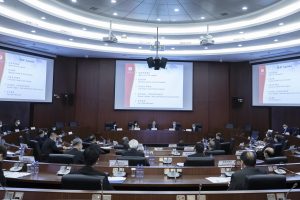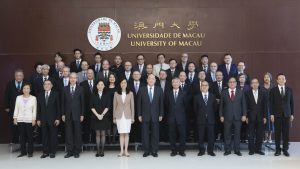The University of Macau (UM) held the Joint Meeting of the University Assembly (UA) and University Council (UC) for the 2019/2020 academic year on 21 July in its Ho Yin Conference Hall. Ho Iat Seng, chief executive of the Macao SAR, chancellor of UM, and chair of the UA, presided over the meeting. Ho stressed that it is the responsibility of local higher education institutions to promote technological innovation, transfer of research results, and diversification of Macao’s economy. He added that as a leading HE institution in Macao, UM should strive to translate technological progress into productivity growth.
During the meeting, the chancellor expressed his expectations for UM in five areas. The first is educational philosophy and features. As the only comprehensive public university in Macao, UM is an important platform for cultivating talent to support the sustainable development of Macao. Therefore, the university must nurture world-class talent who are innovative, socially responsible, internationally competitive, globally-minded, and who love their motherlands. The second is industry-academia collaboration. The country has high expectations for the diversification of Macao’s industries, and the Macao SAR government has also invested enormous resources in education and scientific research. He hopes UM will make new progress in the transfer of technological results and the diversification of Macao’s industries.
The third is serving society. The chancellor hopes that HE institutions in Macao will play a greater role in promoting theoretical studies and innovations of the ‘One Country, Two Systems’ policy. The fourth is faculty development. The chancellor hopes that the university continues to nurture local scholars while at the same time recruiting outstanding talent from around the world. The university should create a fairer and more relaxed environment for faculty members to fully use their talents. The fifth is use of resources. He hopes the university adheres to the principle of frugality and uses resources judiciously in order to get through the difficult times with Macao residents while not affecting the quality of education. Ho also thanked UM faculty, staff, and students for their support to the SAR government’s anti-epidemic campaign.
UC Chair Lam Kam Seng summarised the UC’s work over the past three years. According to Lam, the UC supports the university in the creation of diverse applied programmes in order to nurture innovative and versatile talent. The UC has considered and approved 13 new degree programmes, with the aim of supporting innovation and industrial upgrading in Macao and the Greater Bay Area. The UC also encourages the university to explore new sources of students and gradually increase the proportion of postgraduate students. In terms of promoting the transfer of research results and establishing mechanisms for the protection of intellectual property rights, the UC has approved the Regulation of Management of Intellectual Property for the University of Macau, which clearly defines the IP ownership of UM and its employees. In the future, the UC will further encourage the university to expedite the commercialisation of relevant patents or technologies with market potential. The UC will work with the university to deepen institutional reform and optimise personnel management systems in order to enhance faculty members’ capacity to transfer research results.
UM Rector Yonghua Song also spoke at the meeting. He reported a series of key tasks the university has carried out in response to the epidemic and new developments of the university in recent years. According to Song, UM will increase student enrolment to the extent appropriate and nurture high-calibre talent. He stressed that UM would actively cooperate with the SAR government’s policies and fulfil its social responsibility. The university will support the diversification of Macao’s economy through marketisation of higher education, transfer of research results, nurturing innovative talent, and playing the role of a high-quality think tank. In addition, UM will continue to increase the breadth and depth of its local services, and will also launch training courses for civil servants within this year.
Participants discussed a wide range of topics at the meeting, including the challenges encountered by the university in the process of promoting industry-academia collaboration and enrolment plans for the next few years.
The UA and the UC consist of prominent members of the community, UM’s management, as well as representatives of faculty members, students, and alumni. The following individuals attended this year’s UAUC Joint Meeting: Ho Iat Seng, Lam Kam Seng, Lei Pui Lam, Wong Chong Fat, Lau Veng Lin, Stephen Lee Bun Sang, Maria Edith da Silva, Ma Iao Lai, Susana Chou, Joaquim Jorge Perestrelo Neto Valente, Lao Ngai Leong, Kong Tat Choi, Tse Chi Wai, Anabela Fátima Xavier Sales Ritchie, Tong Chi Kin, Ma Chi Ngai, Kou Kam Fai, Chui Sai Peng, Au Chong Kit, Leong Heng Teng, Vong Hin Fai, Ho Ioc San, Sou Chio Fai, Lou Pak Sang, Iong Kong Leong, Yonghua Song, Hui King Man, Rui Paulo da Silva Martins, Ge Wei, Billy So Kee Long, Kou Mei, Tong Io Cheng, Xu Chengzhong, Kou Kun Pang, Liu Ting Chi, Ao Peng Kong, Kot Man Kam, Chio Ngou In, Wong Chi I, and Secretary-General of UA and UC Leung Kai Chun. Those who sat in on the meeting included Secretary for Social Affairs and Culture Ou Yang Yu and and Chief of the Office of the Chief Executive Hoi Lai Fong.
Source: University Council Office
Media Contact Information:Communications Office, University of Macau
Albee Lei Tel:(853) 88228004Judite Lam Tel:(853) 88228022Email:prs.media@um.edu.moUM Website:www.um.edu.mo


